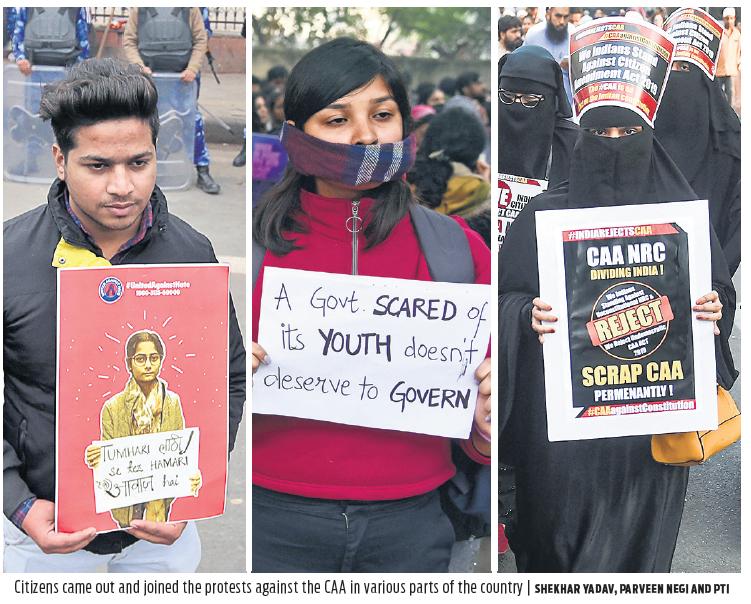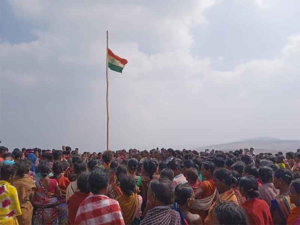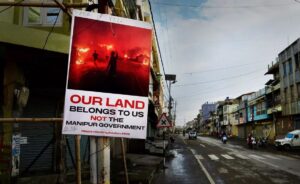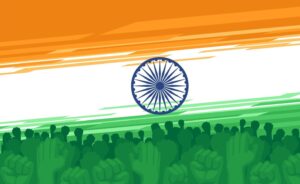Citizens for Justice and Peace
We, the people of India, protest against the move to question our citizenship. We believe that this is an attempt to divide India on religious lines. Our citizenship has been granted to us by law and constitution and we will defend it till our last breath.
Over the past six years, there are clear political moves to fundamentally assault and redefine this Constitutional basis of both Indian nationhood and citizenship. Especially now, with the just passed Citizenship Amendment Act (CAA), 2019, together with a hurried, and not thoroughly debated, all India-level National Population Register (NPR) and National Register of Citizens (NRC) process. The NRC was first experimented with in Assam. The people of Assam have been reeling under this assault on their citizenship for years. As a result of the NRC in Assam, 19 lakh people have been declared as non-citizens in the state. Now, the government is using the CAA 2019 to assure one set of Indians in Assam that they will be “saved” from exclusion from the NRC! Clearly the target is another set of Indians in Assam—the Muslims. Furthermore, the government has announced its intention to extend this process to all over India.
The fact is, once the exercise begins, no one (not even the Hindus) will be spared the trauma and hassle. India’s migrant labour, small farmer, Adivasi and forest dweller, the Dalit–Bahujan masses, all will fall victim to an unconstitutional process. Hundreds of thousands of India’s urban population, living after being displaced through displacement (project-related migration), man-made tragedies (like riots, pogroms) and natural disasters (floods, fires, earthquakes and worse) do not possess the birth-related or land/home registration documents to “satisfy” such an ill-thought out move.
We need to say: #Scrap CAA 2019 #NoNRC NOW!
What is CAA 2019?
The Citizenship Act, 1955 enacted under Article 11 of the Constitution grants citizenship by birth, naturalisation, registration and annexation. For a person to be an Indian citizen by birth: i) he/she must be born in India between 1950 to 1987; ii) if he/she is born in India between 1987 and 2004, one of his parents must be an Indian citizen; iii) if he/she is born after 2004, in addition to one of the parents being born here, the other should not be an illegal migrant.
The 2019 amendment to the Citizenship Act (CAA 2019) makes a promise to entertain requests for refuge and citizenship to all the ‘persecuted minorities’ from three Islamic countries, Pakistan, Afghanistan and Bangladesh who reached India before 2014. The amendment specifies that this special privilege is being extended only to Hindus, Sikhs, Buddhists, Jain, Parsis and Christians from these three countries, and thus it singles out Muslims for exclusion. For example, neither the Ahmadiyas or Sufis, or mere political dissenters, who are also undoubtedly persecuted in Pakistan, find a mention in the amendment. Nor do political dissenters or possible asylum seekers like the Rohingyas from Myanmar or Tamils from Sri Lanka have any place in it.
For the first time, there is a statutory attempt to not just privilege people from some faiths but at the same time relegate another, Muslims, to second-rate status. The CAA 2019 violates Constitutional secular principles and is a violation of Articles 13, 14, 15, 16 and 21 which guarantee the right to equality, equality before law and non-discriminatory treatment by the Indian State.
The government is implying that CAA 2019 will automatically offer citizenship to Hindus. But it is lying—even under CAA 2019, how can it offer citizenship to Hindus who are Hindi, Marathi, Gujarati or Tamil speaking since how can they justify that they have migrated from Pakistan, Afghanistan or Bangladesh?
The NRC in Assam
NRC is a document first prepared in Assam in 1951 on the basis of that year’s general census. For decades, Assam’s linguistic and religious minorities lived under the threat of being labeled “outsiders”, “foreigners”, “and illegal migrants.” The “outsider” problem in Assam is over a hundred-years-old and started when the British started bringing in poor Bengali labourers to cut forests and cultivate land in Assam. It was compounded by the British themselves who stoked the fires of division and violence in Assam under their policy of divide and rule. This led to mass movements against outsiders, widespread violence and riots which culminated in parallel, often conflicting official processes to detect foreigners.
After years of violence in which thousands of people were killed, the Assam accord signed in 1985 paved way for a register of citizens to be prepared and the NRC to be updated. It was seen as a document that will bring peace to Assam and once and for all end the question of who is an Indian and who is an outsider in Assam. Under the Supreme Court’s monitoring, the NRC was perhaps the only process that had the widest public support. This was achieved by involving all stakeholders—students unions, citizen’s groups and political parties—in deciding the modalities of NRC, i.e., what documents will be used and how.
And yet, the final NRC seems to have made everyone unhappy. Far from being “fair and inclusive”, the process has led the people of Assam to trauma and impoverishment. This list took five long years to complete, cost about Rs 1,220 crore and excluded—in the final list released on August 31, 2019—about 19 lakh people. Before that, at different stages, out of the 3.2 crore who applied, first 1.2 crore and thereafter 44 lakh were excluded. Despite detailed modalities prepared with different stake holders, as political winds changed the process was manipulated, so that documents agreed upon were rejected and hundreds of thousands of Indians—Bengali Hindus, Gorkhas, Hindi speaking peoples, Rajbanshis, Muslims—all today face the threat of being declared as non-citizens!
An All India NRC
Despite these terrible consequences, the government has now announced that it going to extend the NRC to all over the country. We need to oppose the NRC because it violates fundamental tenets of the Indian Constitution, that guarantees citizenship for all people, provided they meet certain criteria, irrespective of religion. Through CAA 2019 and the forthcoming NRC, the political aim is similar to the policy adopted by the British during the colonial days of ‘divide and rule’.
What will the all India NRC look like and why is it being done?
- What is the need for an All India NRC?
There has not been a single comprehensive study by the government to determine the number of illegal immigrants living in India. In the absence of official numbers, what is NRC being based on? We already have the AADHAR card, before that the ration-cards. Why then are Indians being put through one more such exercise?
- What documents will be required?
In a country where only 58 percent births are registered, 20 percent children are never enrolled in school and 30 percent of the population has migrated internally for work, documents are a privilege. How will all these people prove their birth and the presence of their ancestors from 40-50 years ago? The lack of documents proving unbroken lineage is particularly difficult for married women. Imagine the nightmarish scenario of a hundreds of millions Indians queuing outside Government offices, hospitals, district centres in order to obtain the required documents. The government will be doing nothing else for years. Like what happened in Assam, all of us will only be queuing up for documents!
- What is the cut-off date going to be?
The cut-off date is the date before which you or your ancestor’s presence on the Indian soil needs to be proved. In Assam and Assam alone (due to the Assam Accord) the date was 1971. In the rest of India, will it be 1987 or 1950? Imagine looking for forty or seventy-year-old documents!
- What is the cost going to be?
Remember that we are discussing this in 2019 when India is in the middle of a full-blown economic crisis. In Assam, the cost of examining the citizenship of 3.2 crore human beings came to Rs 1,220 crore for the state alone! Apart from this, those individuals who did not have the necessary documents often had to spend several thousand rupees to obtain the necessary documents, and in the process many have become economically crippled.
India has a population of 134 crore! This means that the government of India will spend no less than Rs 51,000 crore for examining the citizenship of all the people in the country. To put that in perspective—the Central Government’s budgetary allocation for the Ministry of Health and Family welfare is Rs 65,000 crore. Can India afford an All India NRC?
- Can the government question our citizenship?
To grant a government, any government, the right to examine the citizenship of 134 crore human beings on the basis of a few documents is to grant it extraordinary and undemocratic power, especially if there are no checks and balances. In Assam the modalities of implementing the NRC were discussed with ALL stakeholders (political parties, eminent citizens, students’ unions, citizen groups) and only then the process was started. Yet manipulations and perversions crept in. Can an all India process begin without transparent public consultations? Are we not living in a democracy?
- Is the government competent enough to question our citizenship?
Who amongst us has our correct name written in all government identity documents? Which government department in India functions with empathy? In a country whose bureaucracy and government office system is known for its leakages, corruption and incompetence, how is the sensitive task of proving citizenship being left to the mercies of the ‘sarkari’ system? In Assam, Saken Ali was sent to a detention camp simply because an additional ‘h’ was added to his name in a few government documents. He spent 5 years inside. Several people have died inside foreigner detention camps in Assam while fighting their exclusion from the NRC in courts. The family of India’s fifth president, Fakhruddin Ali Ahmed, was excluded from the NRC. Former Indian army officer and Kargil war veteran, Mohd. Sanaullah, was also sent to a detention camp before he was released on bail.
- What happens if you are excluded from the All India NRC?
The only way to answer these questions is to look at the experience of Assam. In Assam suspected ‘foreigners’ and those left out of the NRC have to go through a punishing legal process that begins with quasi-judicial bodies called ‘Foreigner Tribunals’. These tribunals are closed to public and journalistic scrutiny and their functioning is opaque. How these FTs declare someone or the other a ‘Foreigner’ is often arbitrary. Cases can drag on for years or be decided in a jiffy. Once declared a foreigner, you can be sent to a Detention Camp. The situation in these detention camps, where families are separated and living conditions are subhuman, is nightmarish. The question is, do you deserve such a treatment even if you are a foreigner?
National Population Register (NPR)
The Government of India has declared that it will conduct a door to door survey to determine the usual residents of India from April 2020 to September 2020. Harmless as that may sound, the NPR is expected to become the basis on which the All India NRC will be drawn up. At the end of the door to door survey, a list of people who have made it to the list will be declared. People whose names do not appear in NPR will have to appeal against it and present relevant documents to the district registrar who will then take a decision whether the said person is a citizen or not. So what documents will these ‘sarkari’ officers ask of us when they come to our doorstep? What documents will satisfy the registrar?
As is its style, this government has not yet notified what modalities will this door to door enumeration use? What documents will be asked for? What documents will work and what won’t? How will such a significant exercise take place? What criteria will be used?
Who is an Indian?
Does the possession of a few pieces of paper make us Indian? Does being born in a particular religion make us Indian? Does our belief in one political ideology more than others make us Indian? Who decides who is an Indian?
Narrow definitions indeed for a people who take pride in being an ancient civilisation, where tongues and colours and tastes change completely every few miles, where some of the greatest philosophies of this world have been born and debated for a millennia. No single idea can lay claim to being the idea of India. No single definition exists that decides who is an Indian and who is not.
[Citizens For Justice and Peace (cjp.org.in) has been involved in a two-year-long volunteer led movement in Assam where it helped people fill out over 10 lakh NRC forms, got people released from detention camps, and filed intervention applications in the Supreme Court. Now it is conducting trainings all over the country on the countrywide NPR–NRC. For details, contact info@cjp.org.in.]




